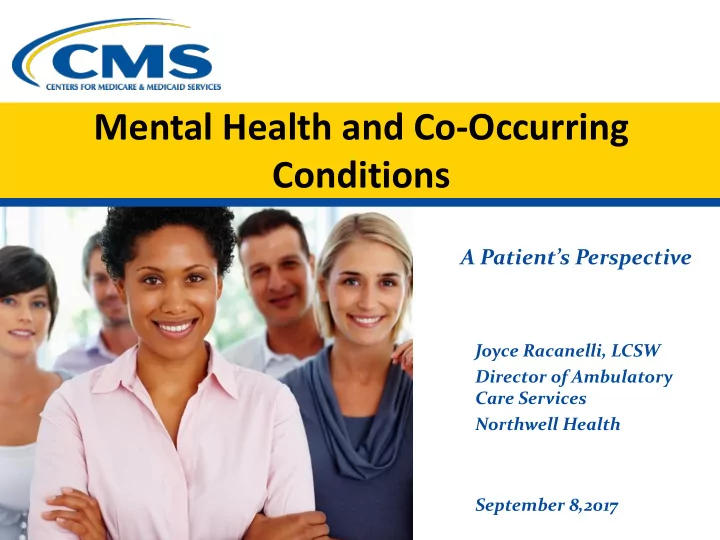

Mental Health and Co-Occurring Conditions A Patient’s Perspective Joyce Racanelli, LCSW Director of Ambulatory Care Services Northwell Health September 8,2017
We are Northwell Health House Calls Advanced Illness Management – Northwell Health House Calls Program • One of the nation’s largest health • Delivers HBPC to over 1200 care systems located in NYC, Long debilitated, homebound older Island and Westchester adults in Queens, Nassau and • New York’s largest private employer Suffolk counties with over 62,000 employees • Interdisciplinary, value-driven • Includes 22 hospitals, over 550 model ambulatory and physician offices, – 14 Providers, 5 Social Work Care post-acute services, population Managers, 4 RN Care Managers health management, emergency medical services • Program goals include decreasing • disease burden, improving Service area of over 8 million people symptoms, reducing caregiver in one of the most demographically stress, decreasing unwanted care, diverse places in the country and providing full support for those aging at home
Who We Serve • House Calls patients have multiple chronic medical, mental health and behavioral conditions, including a high prevalence of dementia • A third of our patients with dementia have some sort of behavioral disturbance • Mental or behavioral health condition, 35.83% – Depression, 25% – Anxiety, 15% – Bipolar Disorder, 1% – Schizophrenia and Other Psychotic Disorders, 1% C0-Occurring Conditions: Chronic Conditions Hypertension 69% Alzheimer's Disease and Related Disorders or Senile Dementia 52% Hyperlipidemia 31% Diabetes 29% RA/OA (Rheumatoid Arthritis/ Osteoarthritis) 26% Acquired Hypothyroidism 23% Heart Failure 21% Atrial Fibrillation 20% Ischemic Heart Disease 18% 3
Who We Serve: Case 1 A 58 year old female patient with severe and persistent mental illness with an extensive h/o psychiatric hospitalizations when she joined the program in 2014. • Living Situation: lived with mother, also a House Calls patient • Homebound due to : psychiatric illness and comorbidities • Psychiatric Diagnosis: schizoaffective disorder • Comorbidities: hypertension, hypothyroid, obesity, CKD • Functional Status: relied on aide for assistance with ADLs and IADLs • Caregiver Support: out of town family support • Advance Care Status: family member was Power of Attorney and Health Care Proxy for both patient and mother • Primary Concerns : management of psychiatric illness and planning for living situation when her mother’s condition deteriorated • Services/Interventions: supervised medication compliance 2x’s weekly and home visits from psychiatry through the Assertive Community Treatment (ACT) Team, the House Calls team provided primary care; social work counseling and care management bi-weekly; Community Paramedicine 4
Who We Serve: Case 2 A 65 year old female patient pain management needs when she joined the program in 2014. • Living Situation: at home with husband • Homebound due to : pain and debility from fibromyalgia • Behavioral Health Condition: anxiety disorder, depression, insomnia • Comorbidities: chronic pain syndrome, fibromyalgia, mild cognitive impairment • Functional Status: independent, some assistance dressing • Caregiver Support: HHA 8 hours x 5 days – Spouse with caregiver fatigue • Advance Care Status: Do Not Resuscitate, Health Care Proxy • Primary Concerns: pain control/medication management • Services/Interventions: intermittent psychiatric medication management, ongoing House Calls primary care; social work supportive counseling and care management, pain management; Community Paramedicine 5
Who We Serve: Case 3 A 74 year old female with who joined the program in 2015. She had been enrolled due to COPD exacerbation and recent discharge from hospice program. • Living Situation: at home with husband • Homebound due to : debilitating disease process • Psychiatric Diagnosis: bipolar disorder • Comorbidities: CKD, COPD, hypothyroidism, dementia with behavioral disturbances • Functional Status: patient needs some assistance with all ADL’s and IADLs • Caregiver Support: formal HHA 8 hours x 5 days. Spouse supportive but fatigued • Advance Care Status: Do Not Resuscitate and Health Care Proxy • Primary Concerns: managing the patient as her physical condition declines; historically her behavioral disturbances increased with psychiatric hospitalizations needed. • Services/Interventions: increased visit frequency by provider and social work care manager; community psychiatric visits until patient became homebound; community paramedicine; caregiver supportive counseling 6
House Calls Provider Survey Results • Informal survey : managing patient’s behavioral and mental health needs • What percentage of your current patient panel do you feel could use additional behavioral health support? 42% (average) • Comments/Suggestions: • “High incidence of depression, anxiety, mood disorders, undiagnosed mental health disorders, borderline personality disorders and substance dependency” • “We need psychiatric assistance from [professionals]. It’s extremely common in geriatric homebound patient population and very difficult to manage with no training in psychiatric illness” • “Home based psychotherapy: cost is a factor as any home care psychiatric costs more than most can afford” • “Having a psychiatrist paid by Medicare join our team 1 -2x/month; current psychiatrists are charging $500- $1000 to visit patients once” • “Many family members can use behavioral health support” • “Would love to have option for video conferencing for psych support” 7
Recommendations • Recognize and implement plans that achieve the highest quality of care, within a patient centered model for patients having mental health needs along with co-occurring conditions while addressing payment and cost. • Continue building on existing HBPC models by integrating psychiatric support to homebound patients and assist providers through consultation and medication management. • Continue to train behavioral health professionals to be utilized as care managers and counselors to allow for billing opportunities similar to CoCM. (Collaborative Care Model) • Support technology infrastructure to bring behavioral health services to patients through telemedicine or Project ECHO-like structure. • Develop advance training programs for home health aids to allow for administration of medications in order to support patient adherence to medication regimens prescribed. • Recognize and build relationships with informal and formal caregivers as a source of support for the patient and the medical team. 8
Thank You 9
Recommend
More recommend